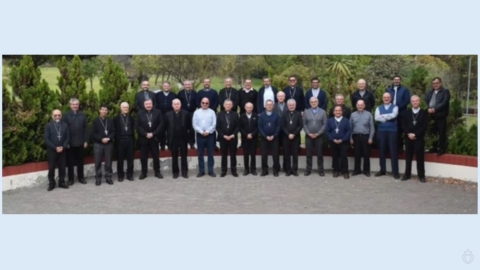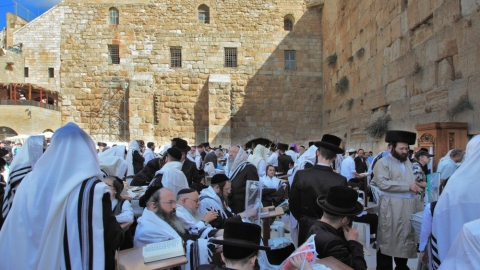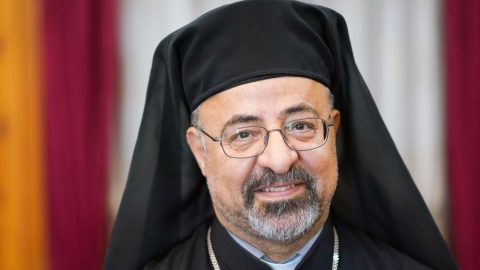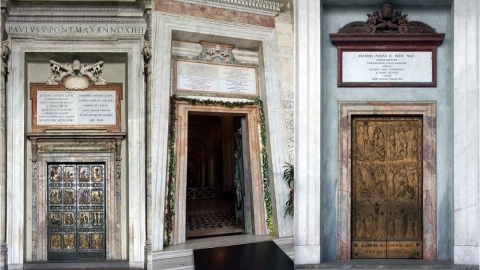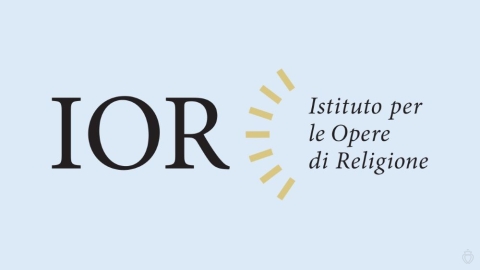The Stages of the Pope's Trip to Hungary, April 28-30, 2023
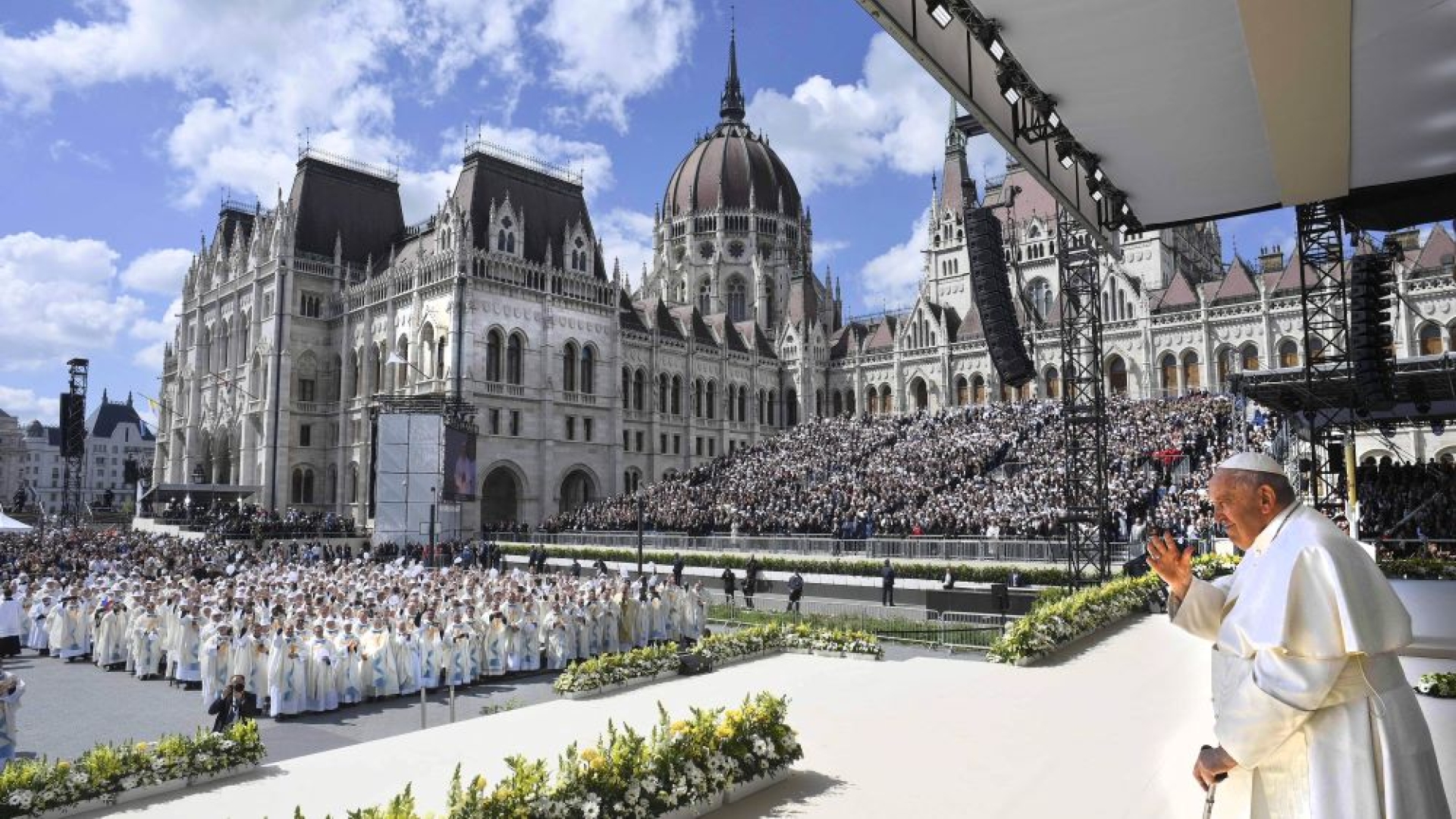
Pope Francis in Kossuth Lajos Square. In the background, the famous Hungarian parliament building
Pope Francis made his 41st trip outside Italy from April 28-30, 2023, going once again to Budapest, where he had already visited on September 12, 2021 at the closing of the International Eucharistic Congress. This time, Hungary being a country bordering Ukraine, the Pope spoke about the Russian-Ukrainian conflict. Hungary strongly supports Ukraine with humanitarian, but not military, aid.
Friday April 28
After meeting behind closed doors for 25 minutes with Katalin Novák, President of the Hungarian Republic, then 20 minutes with Prime Minister Viktor Orbán, the Sovereign Pontiff spoke for 20 minutes before the authorities of the country and the diplomatic corps gathered in the former Carmel which houses the seat of government in the heart of the Hungarian capital.
More than a year after the invasion of Ukraine by Russian troops, the prospects for peace seem non-existent, and while Kyiv is preparing to carry out a counter-offensive in the spring, Francis has decided to raise the European consciences of the Budapest. “Where are the creative efforts for peace?” he asked, while supporting Hungary's isolated voice for a diplomatic resolution to the war.
Commending the country for its family policies when some promote “gender culture” and abortion, he also denounced the “self-referential populism” and stressed the need to welcome migrants. He pleaded for the subject to be addressed “without excuses or delays.” Because, it is “urgent for Europe to work on safe and legal ways” to respond to the historic challenge which cannot be mastered by rejection.
Then, at St. Stephen's Cathedral in Budapest, the Pope met with bishops, priests, deacons, consecrated persons, seminarians, and pastoral agents from the various dioceses of the country. In dealing with the challenges that the Church must face, he explained, she is called to a “prophetic reception,” by showing evidence of listening, of communion, and above all of fidelity to prayer.
Saturday April 29
On the second day of his visit, the Holy Father went to the Church of St. Elisabeth of Hungary for a meeting with the poor and refugees. Hungary has welcomed more than a million Ukrainian refugees since the start of the Russian offensive in February 2022, of which some tens of thousands have settled permanently.
In his speech, the Pope recalled that the poor are “at the heart of the Gospel.” The Christian must not “be imprisoned by a piety removed from life, one that results in a kind of ‘spiritual egotism,’ a spirituality of my own creation that serves to preserve my own inner tranquility and complacency.” He highlighted the example of St. Elizabeth, “the daughter of a king,” who “felt repelled by worldly riches and vanities, and sought to renounce them and care for those in need.”
Next, Francis went to the Papp László Budapest Sportaréna, the capital's Sports Palace, where nearly 12,000 young Catholics were waiting for him. He was particularly happy and energetic, speaking with a very lively tone, and seeking to dialogue with the assembly, in a speech peppered with improvisations. After a speech by Msgr. Ferenc Palánki, bishop in charge of youth ministry, traditional Hungarian dances were performed, then four young people presented their testimonies.
The Sovereign Pontiff reminded the young people how much Jesus is “a friend, the best of friends. He is a brother, the best of brothers. . . God always forgives; He is always there to lift us up whenever we fall.” Christ does not come to restrain anyone, he continued, but he wants his disciples to be “young people who are free and press ahead, fellow travelers of a God who listens to their needs and is attentive to their dreams.… He never disparages our expectations but, on the contrary, raises the bar of our desires,” underlined the Holy Father.
“Do you sense how good it is to love the Lord, to have a large family, to help those in need? Then carry on, don’t think that these are unattainable desires. Rather, invest in the great goals of life!” encouraged Francis. And he warns: “Nowadays there is a great temptation to be satisfied with a cell phone and a few friends. What a pity! Even if many people are willing to settle for that, or even if you are too, it's not good or healthy. You cannot shut yourselves away in small groups of friends, talking only on your cell phone.”
The pope insisted on the need to preserve silence, “Silence is the soil in which we cultivate good relationships. It allows us to entrust to Jesus whatever we are feeling,” to maintain our spiritual life. “Silence is not to sitting glued to your cell phone, or on social media. No, please! Life is real, not virtual. It does not take place on a screen, but in the world!” he implored the young Hungarians.
He continued, “Silence is “the door to prayer, and prayer is the door to love.… Prayer is dialogue of life; prayer is life,” he said, referring to the musician Franz Liszt who combined prayer and playing his instrument. The Holy Father also invited young people to “have this courage of honesty. Instead of having to act as if you are never afraid, you can freely share your vulnerability with the Lord and with others, without hiding or disguising anything, without wearing a mask.”
Because, “on every page, the Gospel tells us that the Lord does not do great things with exceptional people, but with ordinary and weak people like ourselves,” he explained. “Remember that no one can take your place in the history of the world and the Church: no one can take your place, no one can do what only you can do. Let us help each other, then, to believe that we are loved and precious, that we are made for great things,” he wished at the end of this speech.
Back at the Apostolic Nunciature, the Pope spoke briefly with Hilarion, the Orthodox Metropolitan of Hungary, former chairman of the Department of External Church Relations of the Patriarchate of Moscow. The Press Office of the Holy See specified that this meeting was cordial and lasted about 20 minutes. This meeting at the nunciature was not planned as part of the program, and Francis explained himself on the plane during the return flight:
“Hilarion is a person I respect a lot. We have always had a good relationship. And he had the courtesy to come and visit me,” he said. “I also saw him at the airport. Hilarion is a smart person to talk to. And it is necessary to maintain this relationship. We talk about ecumenism. I like it. We have to keep an outstretched hand with everyone.”
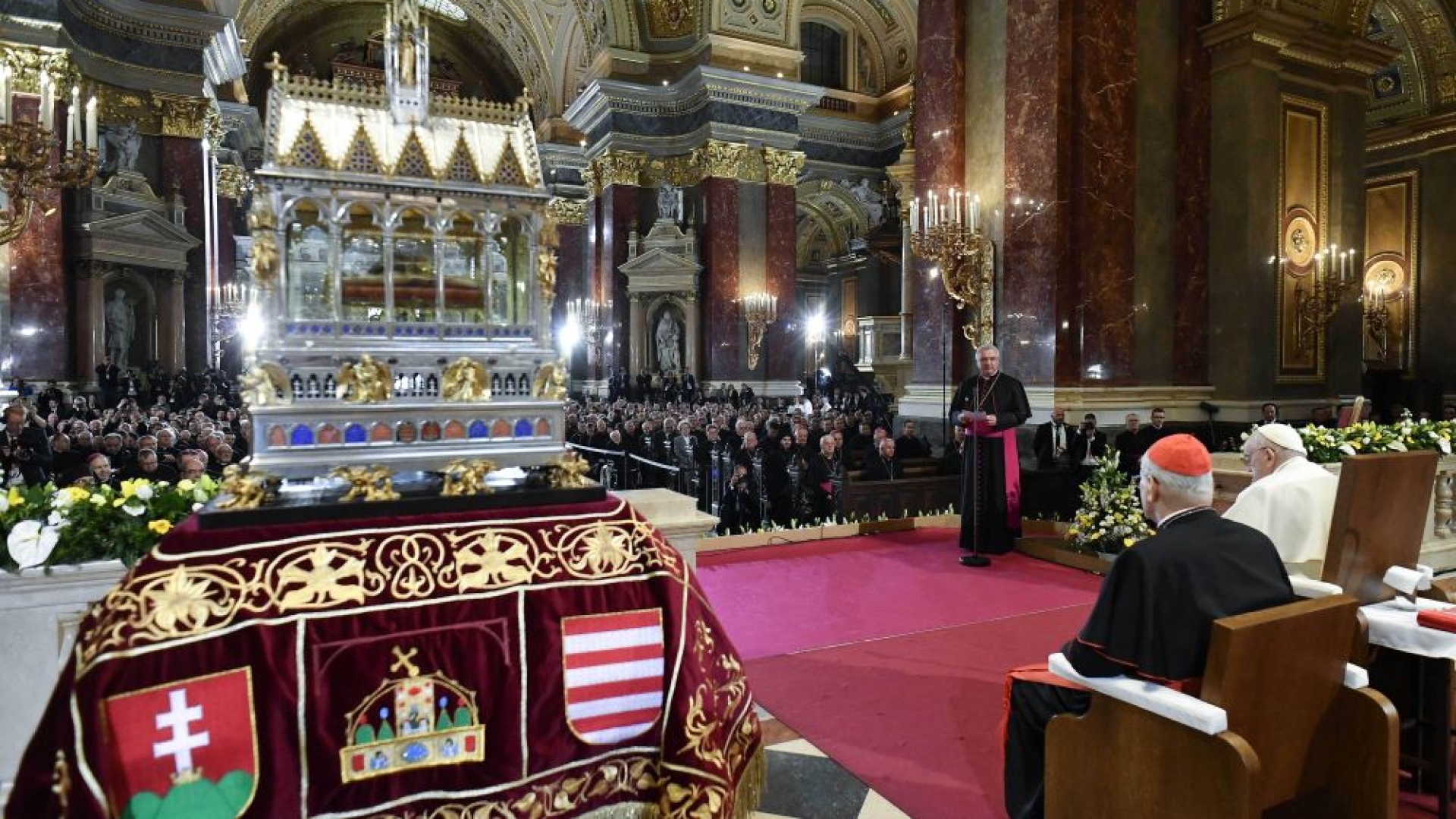
Le pape François dans la cathédrale Saint-Etienne de Budapest
Sunday April 30
The Sovereign Pontiff celebrated Mass in Kossuth Lajos Square, in the center of Budapest, in front of 50,000 people. Metropolitan Hilarion attended. In his homily centered on the meaning of welcome, the Holy Father appealed to the metaphor of the open door, which allows us to enter Jesus's “enclosure” and to leave it to spread the good news and help Hungary grow in brotherhood.
“It begins with the call of God, with His desire to come to us, with His concern for each one of us, with the abundance of His mercy. The Lord wants to save us from sin and death, to give us life in abundance and joy without end,” the pope said. “Today too, Jesus calls us, in every situation, at all those times when we feel confused and fearful, overwhelmed and burdened by sorrow and self-pity. He comes to us as the Good Shepherd, He calls us by name,” he insisted.
Regarding the presence of the ecumenical delegates, God “called us together, and so we are His people, His flock, His Church. Though we are diverse and come from different communities, the Lord has brought us together, so that His immense love can enfold us in one embrace,” he said. Evoking the internal relations in the Catholic Church and those with the different confessions, Francis invited us to “cultivate relationships of fraternity and cooperation, avoiding divisions, not retreating into our community, not concerned to stake out our individual territory, but rather opening our hearts to mutual love.”
The pope denounced “the closed doors of our selfishness with regard to others; the closed doors of our individualism amid a society of growing isolation; the closed doors of our indifference towards the underprivileged and those who suffer; the doors we close to those who are foreign or unlike us, towards migrants or the poor.” He thus asked everyone to be “open and inclusive, then, and in this way, help Hungary to grow in fraternity, which is the path of peace.”
Finally, the Pope spoke to the academic and cultural world at the Faculty of Computer and Bionic Sciences of the Catholic University Péter Pázmány. He invited them to reflect on the causes and consequences of the ecological crisis, “in which nature is merely reacting to its exploitation at our hands.” Francis denounced the lack of limits allowed by an evolution of society that concentrates “on the individual, absorbed in his or her needs, greedy for gain and power.”
And he quotes Lord of the World, by Robert Hugh Benson, published in 1908. This Anglican pastor who became a Catholic describes “a future dominated by technology, where everything is made bland and uniform in the name of progress.” The pope describes this narrative as proclaiming “a new 'humanitarianism' cancelling diversity, suppressing the distinctiveness of peoples and religion, abolishing all differences.”
“In the technically advanced yet grim world described by Benson, with its increasingly listless and passive populace, it appears obvious that the sick should be ignored, euthanasia practiced and languages and cultures abolished, in order to achieve a universal peace that is nothing else than an oppression based on the imposition of a consensus.” The news shows that this “somber scenario” had a “prophetic” dimension, he underlined.
Pope Francis explained that scholars must carry out their research in this way, recognizing their own limitations and curbing their “presumption of self-sufficiency.” While “technocratic thinking pursues a progress that admits of no limits, yet flesh and blood human beings are fragile; and it is precisely by experiencing this, that they come to realize their dependence on God and their connectedness to others and to creation.”
Evoking “the shift from communism to consumerism,” he warned his listeners against the impasses of the transition “to pass from a blinkered freedom to an unbridled freedom.” Only Jesus “frees us from out fixations and our narrowness,” he insisted, inviting the university to become “a laboratory of hope.”
The Sovereign Pontiff then returned to the international airport of Budapest, to return to Rome.
New Condemnation of “Backwardism”
On May 9, La Civilta Cattolica published the interview granted by Pope Francis to the Hungarian Jesuits during his trip. One of the questions asked concerned the Second Vatican Council; he specified that “the Council is still being applied. It takes a century for a Council to be assimilated, they say. And I know that the resistance to its decrees is terrible.”
He continued: “There is unbelievable restorationism, what I call indietrismo (backwardness), as the Letter to the Hebrews (10:39) says: 'But we do not belong to those who shrink back.” – It should be noted that this text of St. Paul is quoted very inappropriately, because it mentions those who apostatize, to retreat – or to withdraw – meaning “to abandon the faith.”
“The flow of history and grace goes from the roots upward like the sap of a tree that bears fruit. But without this flow, you remain a mummy. Going backwards does not preserve life, ever. You must change, as St. Vincent of Lérins wrote in his Commonitory, when he remarked that even the dogma of the Christian religion progresses, consolidating over the years, developing with time, deepening with age.”
“But this is a change from the bottom-up. The danger today is indietrismo, the reaction against the modern. It is a nostalgic disease. This is why I decided that now the permission to celebrate according to the Roman Missal of 1962 is mandatory for all newly consecrated priests.”
“After all the necessary consultations, I decided this because I saw that the good pastoral measures put in place by John Paul II and Benedict XVI were being used in an ideological way, to go backward. It was necessary to stop this indietrismo, which was not in the pastoral vision of my predecessors.”
In response to the Pope Francis’s arguments, the FSSPX.News site on May 10 conveniently recalled what the Commonitorium of St. Vincent of Lérins, written in 434, really says:
“II.6. In the Catholic Church itself, all possible care must be taken, that we hold that faith which has been believed everywhere, always, and by all. For that is truly and in the strictest sense ‘Catholic,’… This rule we shall observe if we follow universality, antiquity, consent.”
“We shall follow universality, if we confess that one faith to be true, which the whole Church throughout the world confesses; antiquity, if we no wise depart from those interpretations which it is manifest were notoriously held by our holy ancestors and fathers; consent, in like manner, if in antiquity itself we adhere to the consentient definitions and determinations of all, or at least of almost all priests and doctors.”
“III. 1. – What then will a Catholic Christian do, if a small portion of the Church has cut itself off from the communion of the universal faith? – What, surely, but prefer the soundness of the whole body to the unsoundness of a pestilent and corrupt member? 2. What, if some novel contagion seek to infect not merely an insignificant portion of the Church, but the whole? – Then it will be his care to cleave to antiquity, which at this day cannot possibly be seduced by any fraud of novelty.”
(Sources : cath.ch/imedia/vatican news/FSSPX.actualités/DICI n°432 – FSSPX.Actualités)
Illustration 1 & 2 : Banque d’images Alamy
